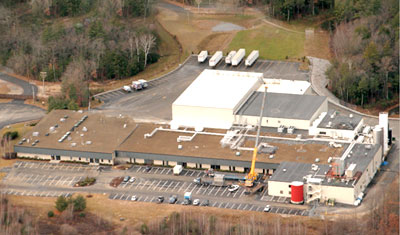FOOD PROCESSING
Organic Growth
| H |
ealth-minded foodies are propelling U.S. organic food sales to record levels. Sales were nearly US$14 billion in 2005, about 2.5 percent of the overall food market, and the Organic Trade Association expects that figure to grow to nearly $16 billion by the end of this year. Meat, condiments and dairy products are the fastest growing categories. But the industry has some hurdles if it expects to keep this rapid pace.
"The major challenge is the shortage of supplies and there really isn't enough organic food to supply demand," says Amarjit Sahota, director
 |
| Stonyfield Farms, part of the huge France-based Group Danone, is more than doubling the size of its Londonderry, N.H., manufacturing facility and adding 80 jobs as it ramps up to supply export markets. |
Sahota says most of the industry's growth has come from conventional food processors developing organic lines by installing dedicated production lines or by running organics on their regular machinery. He says larger players in the sector – like Amy's Kitchen, building a $40-million facility in Medford, Ore. – are expanding.
"Two countertrends are developing," Sahota says. "First, more companies are dealing in organic foods and that's increasing quite
 |
| Amarjit Sahota, director of London- based Organic Monitor |
New Hampshire-based Stonyfield Farms, the largest U.S. manufacturer of organic yogurt, is an example of this trend, Sahota says. Stonyfield was acquired by the French Group Danone, which, according to published reports in France, is spending $66 million to boost capacity at its Londonderry, N.H., facility, for export sales. Stonyfield officials decline to comment on the dollar amount, but say the Londonderry facility is more than doubling its space to 277,000 sq. ft. (25,700 sq. m.) and adding 80 employees. This will boost the company's current annual 66,000-ton capacity to 112,000 tons by 2007 and 136,000 tons by 2008.
Another organic dairy products project is developing in Elma, N.Y., in western New York's Erie County, where Steuben Foods is investing $18.75 million for construction of a new organic milk processing plant in cooperation with Horizon Organic that will add 28 jobs.
But the biggest effect on the industry looms as Wal-Mart begins to plunge deeper into the organics market, Sahota says.
"Wal-Mart will have a significant effect and it will be mostly positive because Wal-Mart will encourage a lot of existing suppliers to start dealing with organic foods," he says. "There will be more conversion to organic practices and more companies will come into the industry. It's also going to be very positive for consumers because they will have access to organic foods in a larger number of outlets. On the downside, for organic suppliers, Wal-Mart coming in will lower prices, squeeze margins and that could cause a price war."

